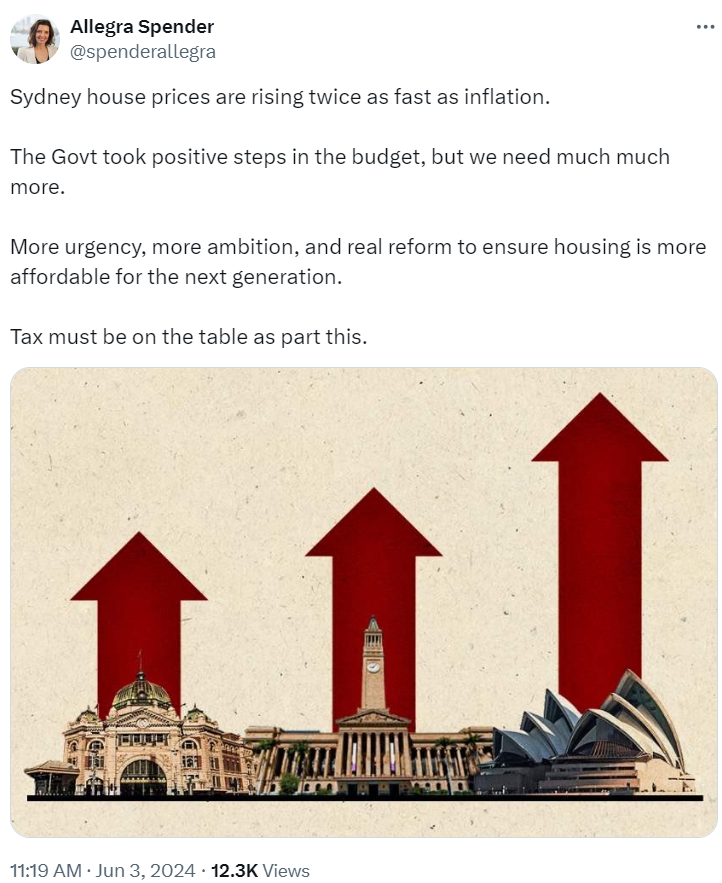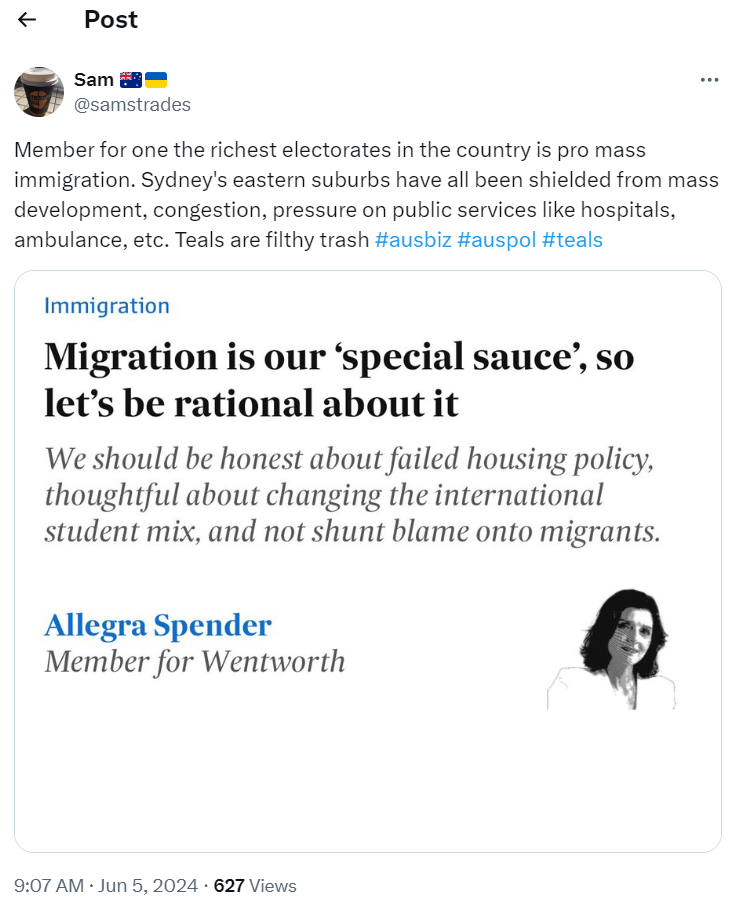The hypocrisy of Teal independent member for Wentworth, Allegra Spender, continues to astonish.
Merely a day after shedding crocodile tears over the cost of housing in Sydney:

Spender penned a propaganda piece in The AFR cautioning against cuts to immigration, arguing that migration is Australia’s “special sauce”:

“Migration has been a secret sauce to Australia’s long-term economic success”, Spender claims. “Sadly, the politics has turned toxic already”.
“Migrants are not the driver of rental stress – it’s the failed housing supply policies of successive local, state and federal governments, as well as our shift to fewer people per dwelling”.
“Our current population estimates are similar to those projected pre-COVID. But decades of poor housing policies mean we just aren’t ready for our rising population numbers or our changes in behaviour”, Spender claims.
Spender also spins the faux education export excuse as to why international student numbers shouldn’t be cut:
“Dramatic swings in policy here are dangerous and short-termist. Education is our fourth-largest export earner and is particularly valuable as fossil fuel exports decline over time”, she says.
As usual, Spender has deliberately ignored the fact that the bulk of these export revenues are fake because the ABS wrongly counts all expenditures by students in Australia as exports, even when the money used to pay for these expenditures is earned in Australia.
Salvatore Babones, Associate Professor at Sydney University and author of the book, “Australia’s Universities, Can They Reform?”, recently summed up the international education “export” farce as follows:
[The $46 billion export figure] is based on the fantastical model that a typical international student saves up the full cost of tuition, housing, meals, and incidentals, transfers it to an Australian bank, and then lives on that money for the duration of stay in Australia.
This may be true for a small number of elite university students. But university students make up only 45% of the international student total, and most of those are non-elite.
Just watch the 2019 Four Corners special Cash Cows to find out how things really work at a typical university, and then remember that most international students are not even in universities, but in low-level vocational and English-language courses.
The idea that all (or even a substantial portion) of the money spent by these students is transferred from abroad, rather than earned in Australia, is flatly ridiculous.
To see that, just remember the uproar that broke out in 2020 when Scott Morrison refused to extend JobKeeper and JobSeeker to international students. Most international students in Australia work very hard, but the fact is that they come to Australia primarily to work, not to study.
The tuition they are required to pay is simply part of the cost of their work visas…
In short, the entire international student industry is, in essence, a giant immigration scam.
Spender also spins the line that “the average permanent skilled migrant contribution to government budgets has been estimated at nearly $200,000”, while completely ignoring the costs of migration on the budgets of governments and households.
For example, Dr. Jane O’Sullivan estimates that the public infrastructure bill for federal, state, and local governments is around $130,000 per new resident. Existing residents are also subject to additional fees (such as tolls and user charges).
Immigration boosters like Allegra Spender deliberately ignore the cost savings from lower levels of immigration. They also overlook the disadvantages of residents having to live in tiny shoebox apartments rather than detached houses with backyards.
Any resident of Sydney will understand that they have been left worse off as housing, infrastructure, and services have failed to keep up with two decades of rapid population expansion.
Sydneysiders have seen their cost of living rise as the cash-strapped state government has privatised old and new infrastructure, resulting in higher user pay costs.
Having fewer migrants enter Australia would reduce the need to provide so much infrastructure, such as hospitals, schools, water supplies, and public housing.
Allegra Spender has also described Peter Dutton’s modest planned cuts to immigration as “economically very damaging” and bordering on racism:
“The opposition’s policy is extremely unclear and on the face of it, could be economically very damaging. The Liberal Party used to be the party of rational market-based economic policy, but Peter Dutton has dismissed concerns by respected economists as “voodoo economics”…
“Fanning the flames of fear and anger, particularly now, is exactly the opposite strategy we need when developing thoughtful policies on something as sensitive as migration”.
As usual, Spender cannot fathom that the extreme immigration experienced over the past 20 years has been “economically very damaging”.
Australia’s productivity growth has collapsed as the level of net overseas migration has run well above the growth in business, infrastructure, and housing investment.
Decades of excessive immigration in Australia have resulted in capital shallowing, lowering productivity:

Let’s also not forget that Allegra Spender has lobbied for Australia to meet its net zero commitments, ignoring the fact that having substantially more energy users and consumers in Australia would make achieving net zero impossible.
Such is the unbelievable immigration hypocrisy of the posh Teals.
Twitter (X) user @samtrades neatly encapsulated Spender’s immigration hypocrisy with the following:

Wentworth is effectively a rich gated community that accepts very few migrants, who are instead dumped in the Western Sydney Ghetto.
I suggest that we instead dump the migrants in high-rise towers in Spender’s seat of Wentworth. How about it, Allegra?

